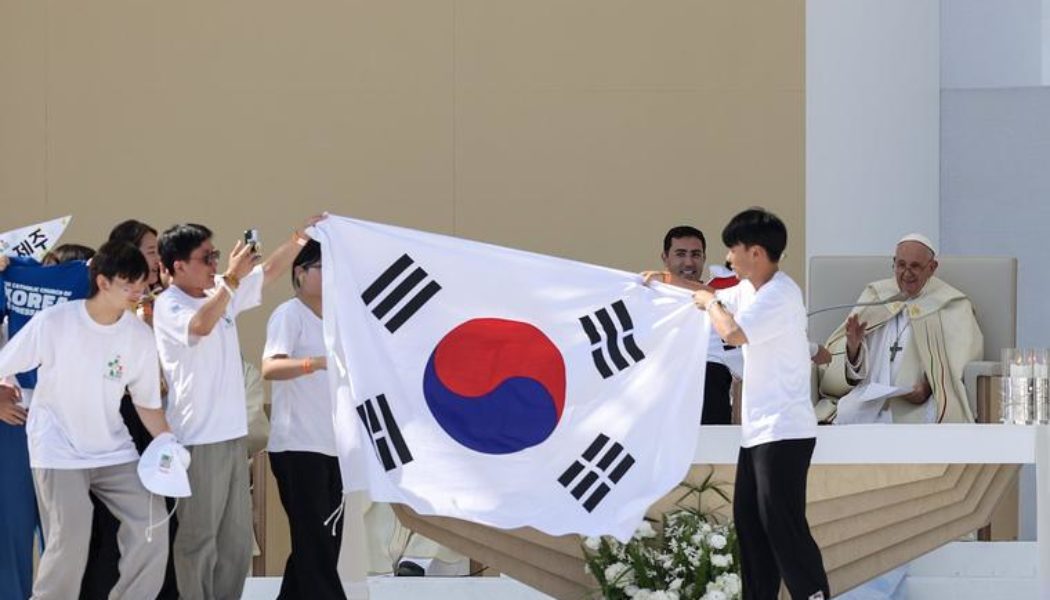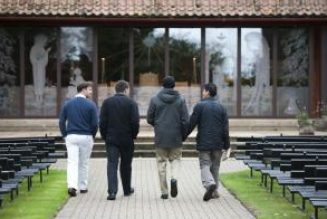
The final Mass of World Youth Day Lisbon coincided with the 30th anniversary of Veritatis Splendor, one of the most important encyclicals of the entire post-conciliar period.
Pope St. John Paul II formally signed it on the Transfiguration, Aug. 6, 1993, though, as is customary for Vatican documents, it was not released until later (Oct. 5).The anniversaries of Veritatis Splendor have been well marked, both on the 25th and now the 30th, in light of the encyclical’s landmark importance for moral theology. But the document was also infused with a spirituality of youth, the fruit of John Paul’s long pastoral experience with university students.
The link between Veritatis Splendor and John Paul’s pastoral approach to youth is deep and profound. This past week illustrated that Pope Francis takes a different approach.
Despite being an accomplished moral philosopher himself, John Paul did not begin his encyclical by laying out the relevant philosophical principles. It begins with an extended meditation on the biblical encounter of the rich young man with Jesus. Jesus is asked about eternal life. He replies that it is necessary to keep the commandments. The rich young man desires more, and so Jesus proposes a more radical discipleship: Sell your goods; give to the poor; follow me.
Thus Veritatis Splendor frames the moral life with the high ideals of youth and their desire to give their lives to a great cause. The corresponding pastoral response accordingly needs to both affirm their capacity for greatness and call them to it. Even though the rich young man declines the invitation, that he goes away sad is evidence that he knows he was intended to be something more, something greater.
Attentive readers of Veritatis Splendor immediately recognized themes that appeared in John Paul’s 1985 apostolic letter to youth, Dilecti Amici (Beloved Friends), a lengthy letter written for the U.N. International Year of Youth. There, John Paul puts the rich young man at the center of his reflections upon Jesus and youth, speaking of “youth itself” as part of the “riches” of the young man. Being young is a “treasure,” for it is an invitation to the great adventure of finding one’s mission in life, to the revelation of God’s project for a particular young man or woman.
John Paul chose the figure of the rich young man for both Dilecti Amici and Veritatis Splendor because he is fundamentally good, keeping the commandments and with his eyes firmly on the greatest good: eternal life. That is the positive vision of young people John Paul had. And while Jesus insists on the commandments, there is a further summons to a discipleship that costs: Sell what you have and care for the poor. The rich young man is asked for a radical giving of his entire life.
The unity of moral rectitude, material detachment, care for the poor and the radical giving of oneself marks both John Paul’s challenge to the young and the theological vision of Veritatis Splendor. All aspects belong together, and all aspects, with God’s grace, are possible.
In his encyclical, John Paul puts that question front and center:
“Is it possible to obey God and thus love God and neighbor, without respecting these commandments in all circumstances? Also, an opinion is frequently heard which questions the intrinsic and unbreakable bond between faith and morality, as if membership in the Church and her internal unity were to be decided on the basis of faith alone, while in the sphere of morality a pluralism of opinions and of kinds of behavior could be tolerated, these being left to the judgment of the individual subjective conscience or to the diversity of social and cultural contexts” (4).
Pope Francis does not insist in his messages to young people upon holding all things together — the commandments, love for the poor and radical discipleship. He is willing to settle for one or the other at various times, perhaps lacking confidence that young people are capable of an integral Christian life.
From early in the pontificate, Pope Francis has kept his distance from Veritatis Splendor. With the appointment of Archbishop Victor Fernández as the new prefect of doctrine, he has now elevated a longtime critic of the encyclical. It follows that if the moral vision of Veritatis Splendor is suspect, then so, too, is John Paul’s pastoral approach to young people.
In two interviews, Pope Francis made the contrast very clear.
Speaking with Vida Nueva, a Spanish Catholic news agency, in an interview published while the Holy Father was in Portugal, Pope Francis recalled a youth initiative in Buenos Aires. On “nights of charity” young people in urban parishes would feed people on the street, after first gathering to briefly read the Gospel and pray together.
“Then one day I met a priest who told me that this project was a waste of time, because after praying and helping the poor, the children left and slept with each other,” the Holy Father continued, adding:
“I told him to stop getting into those things. Young people should be allowed to get on with their lives. I’m not interested in focusing on what they do next; I’m interested in what they do now. If we educate them today to engage with the poor, that is a seed for the future and will influence everything else. But if you only talk to them about chastity, you frighten them all!”
There is something to that. Corporal works of mercy are not a “waste of time” even if a conversion of life remains to be had. Speaking only of chastity would be an odd approach to working with youth — or older people, for that matter. Yet bracketing the moral life as a step too far, as something to be left for another day, was not John Paul’s approach, which he summarized at his “first” WYD in Częstochowa: “You must demand much of yourself, even if others do not demand it of you.”
On his return flight to Rome, after concluding WYD Lisbon earlier that morning, Pope Francis was asked why he had cut so many of his talks short, sometimes leaving them aside altogether. The Holy Father said it was not due to poor health or lack of stamina but, in part, because “young people do not have much of an attention span,” suggesting that “a clear idea, a clear image” might be better suited to get the job done in “eight minutes.”
It’s possible that some young people have short attention spans, but hundreds of thousands who have walked several miles in the hot sun and traveled long distances for days of catechesis, worship and testimonies are not likely suffering from either a lack of interest or attention. John Paul didn’t think so when he would spend hours at the WYD vigil in multiple discourses.
The Holy Father concluded his nine-minute homily at the closing Mass with a repeated invocation of John Paul’s characteristic “Be not afraid.” Yet John Paul had a confidence in the young that Pope Francis does not seem to share; while John Paul saw their capacities, Pope Francis tends to see their limits.
In Dilecti Amici, published on Palm Sunday 1985 — a precursor of WYD — there was a stirring call and act of confidence in young people:
“You are also strong for … the struggle against evil, against the real evil: against everything that offends God, against every injustice and exploitation, against every falsehood and deceit, against everything that insults and humiliates, against everything that profanes human society and human relationships, against every crime against life: against every sin” (15).
John Paul became convinced as a priest and bishop that young people were capable of an integral and radical Christian life. In Veritatis Splendor 30 years ago, John Paul repeated that confident vision for the entire Church.








